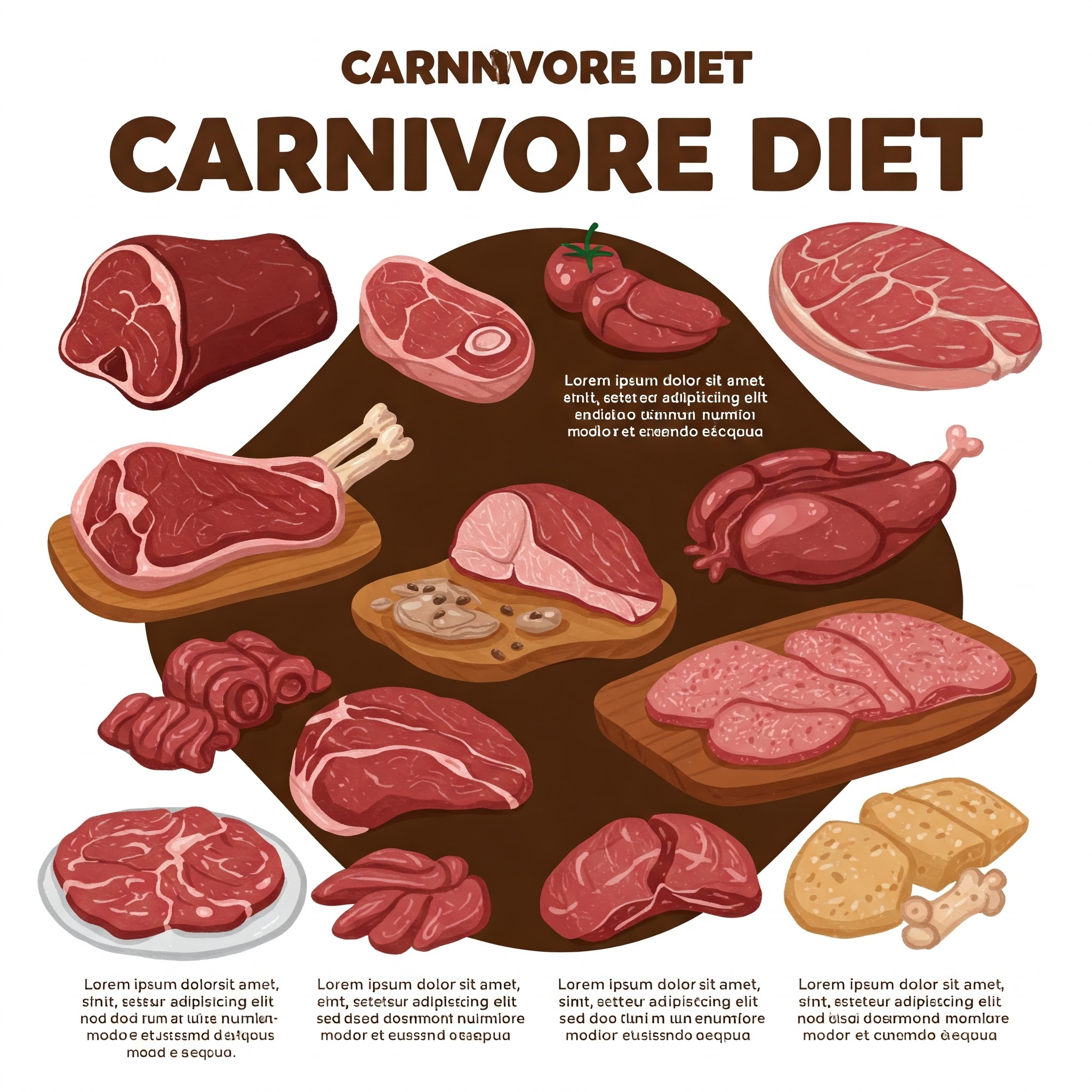Introduction
In the last few years, the carnivore diet – a way of eating based only on food from animals – has drawn interest as folks try out offbeat ways to eat. The big draw? It’s straightforward: drop every plant-based item and stick just to meat, seafood, eggs, or similar animal-sourced stuff. To plenty of people, that stripped-down setup feels like a refreshing change compared to trickier meal plans.
This piece looks into the core parts of the carnivore diet while checking out how it could affect your health. Instead of just listing benefits, it also highlights possible downsides – giving a more balanced view of going full meat-only. If you’re wondering about the research behind it, worried about side effects, or testing fresh ideas for feeling better, this breakdown helps you decide with real info in mind.
During the talk, we dig into myths while checking out new findings – then break down real-life factors. Side by side, let’s peek at what this meat-only plan claims, where it slips up, but also stack it against everyday eating habits.
Understanding the Carnivore Diet
At its heart, the carnivore plan cuts out every kind of plant food – nutrition comes only from animals. That’s totally different from most low-carb ways of eating. Take keto, for instance – it uses butter from plants and allows some veggies now and then. Then there’s paleo, which includes fruit, nuts, tubers, plus plenty of natural foods you can eat. But the meat-only route skips all that stuff completely.
Foods commonly included are:
- Beef – also chicken, plus some pork – then there’s lamb tossed in too
- Fish and seafood
- Eggs
- tallow, like lard – also butter – comes from animals
This way usually highlights nutrients instead of lots of different ingredients, pushing for simple animal-based foods. Getting how it works sets you up to see its impact on well-being, energy levels, maybe even your routine.
Potential Health Benefits of the Carnivore Diet
Some folks try the carnivore diet after hearing stories about better energy or clearer thinking. Even though science hasn’t caught up yet, a few repeated results stand out when people talk about their experiences
Enhanced Mental Clarity
Some people say they think more clearly after cutting out plant-based foods. Others believe it’s because common diet triggers go away.
Body Composition Changes
People on high-protein diets often feel fuller longer, so they tend to eat fewer calories without trying. Because of this shift, some start losing weight or see more toned muscles after sticking with it.
Reduced Inflammation
Some personal stories often mention less joint pain or similar issues tied to swelling. Though lab research isn’t much, the idea that it might lower body flare-ups keeps drawing interest from lots of folks.
Just like every eating plan, results differ a lot from person to person – science hasn’t caught up yet, so clear answers are missing. Even so, people keep talking about the perks, which keeps scientists curious.
Health Risks and Considerations
Some folks do well eating only animal foods, yet plenty struggle with it. Major issues involve:
- Nutrient Gaps
Getting rid of plants means losing key supplies of fiber, vitamin C, or plant compounds. While meat and dairy give plenty of vital nutrients, depending only on these might cause gaps unless you’re really thoughtful about meals. - Cardiovascular Concerns
Eating a lot of animal fat could affect cholesterol or heart-related signs in certain people. Reactions differ, so checking in with a doctor matters if someone plans to keep doing it over time. - Digestive Disruptions
A quick shift to less fiber and more protein might lead to harder stools or different bathroom patterns. Digestive adjustments like this often pop up at the start.
Talking over these risks with a doctor matters if you’re thinking about starting this eating plan.
Common Pitfalls of the Carnivore Diet
Sticking to an eating plan that’s way off from normal habits can cause real-life issues
Social Pressures
Dining out or going to events might seem tough when choices are few. Because of that, you could end up feeling uncomfortable, annoyed, or like you don’t quite fit in.
Limited Variety
Folks on tight eating plans gotta pick carefully to get good nutrition – think liver or oysters, for instance. These foods pack a punch when variety’s limited.
Thinking ahead, talking about food preferences, or asking advice on different nutrients might make things easier.
Before and After: Real-Life Perspectives
Real-life stories help show how the meat-only diet impacts various folks. Many newcomers mention feeling off at first, getting used to no veggies and shifted eating habits. As weeks go by, a few notice more consistent energy levels, fewer urges for snacks, or less stomach trouble.
Still, results can differ a lot. While some people deal with nutrition problems, others find the eating plan too strict. Things like how fast your body burns food, current medical issues, yet how closely you follow the rules shape what happens. Talking to an expert early on keeps small concerns from turning into bigger ones.
These stories show the carnivore diet doesn’t work for everyone – so thinking it through matters. While some gain results, others face issues nobody talks about. Because outcomes differ wildly, checking risks makes sense. Even if a few thrive, most should weigh options first.
Carnivore Diet Results: What to Expect
Outcomes on the carnivore diet differ from person to person. A few often-seen effects are:
- Increased daily energy
- Weight stays steady or goes down
- Improved digestive comfort
- Better concentration – or a steadier mood now and then
Still, there’s no promise these results will happen. Keeping hopes realistic matters when figuring out if this eating plan matches your health aims. Talking with medical pros helps people weigh dangers, track changes, or tweak methods – so staying safe and consistent gets easier.
Conclusion
In this guide, we looked at the main parts of the carnivore diet – its possible upsides along with the issues that come from such a limited way of eating. Some folks say they feel more energetic, happier, or find it easier to manage their weight; meanwhile, others struggle with missing nutrients or stomach troubles.
A clear head about dangers – plus knowing what to expect – helps you choose food smarter. People trying this eating plan need to team up with a doctor so they stay healthy and get the nutrients they require.
Still, the meat-only diet stirs debate while drawing interest among those testing new eating habits. Tackled carefully – yet with an open mind – it might reveal how certain foods affect one’s body differently.
Additional Resources
If you want to know more about eating foods from animals, maybe check out:
Studies look at low-carb plans along with eating approaches that cut out certain foods
Stories about diets built around animals, seen through different eyes
Chats with pros – like nutritionists or doctors – who know a lot about strict eating plans, shared through audio shows
These tools might expand your knowledge, share recent research results, or assist you in making smart choices – depending on if the meat-based plan fits your wellness targets.




